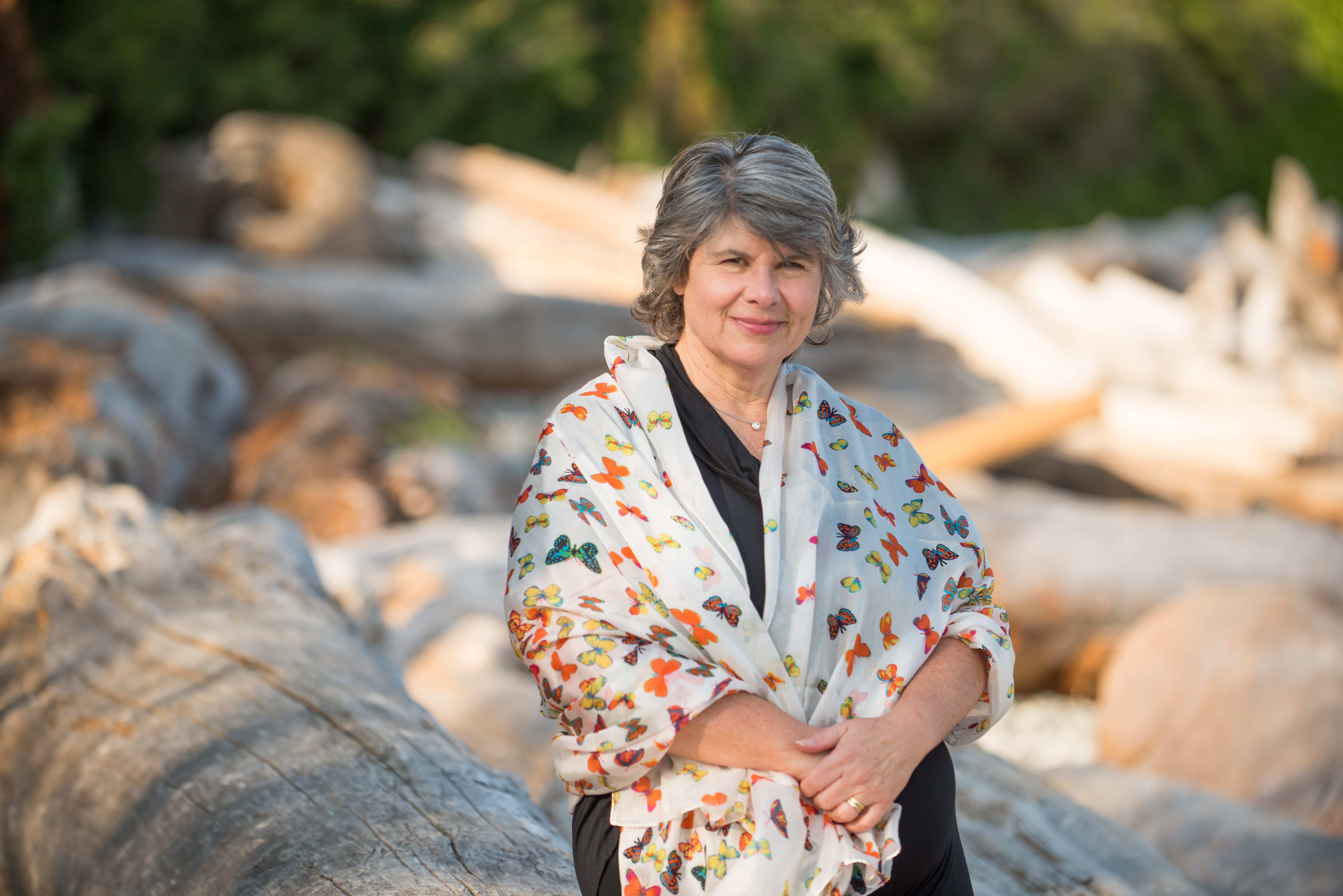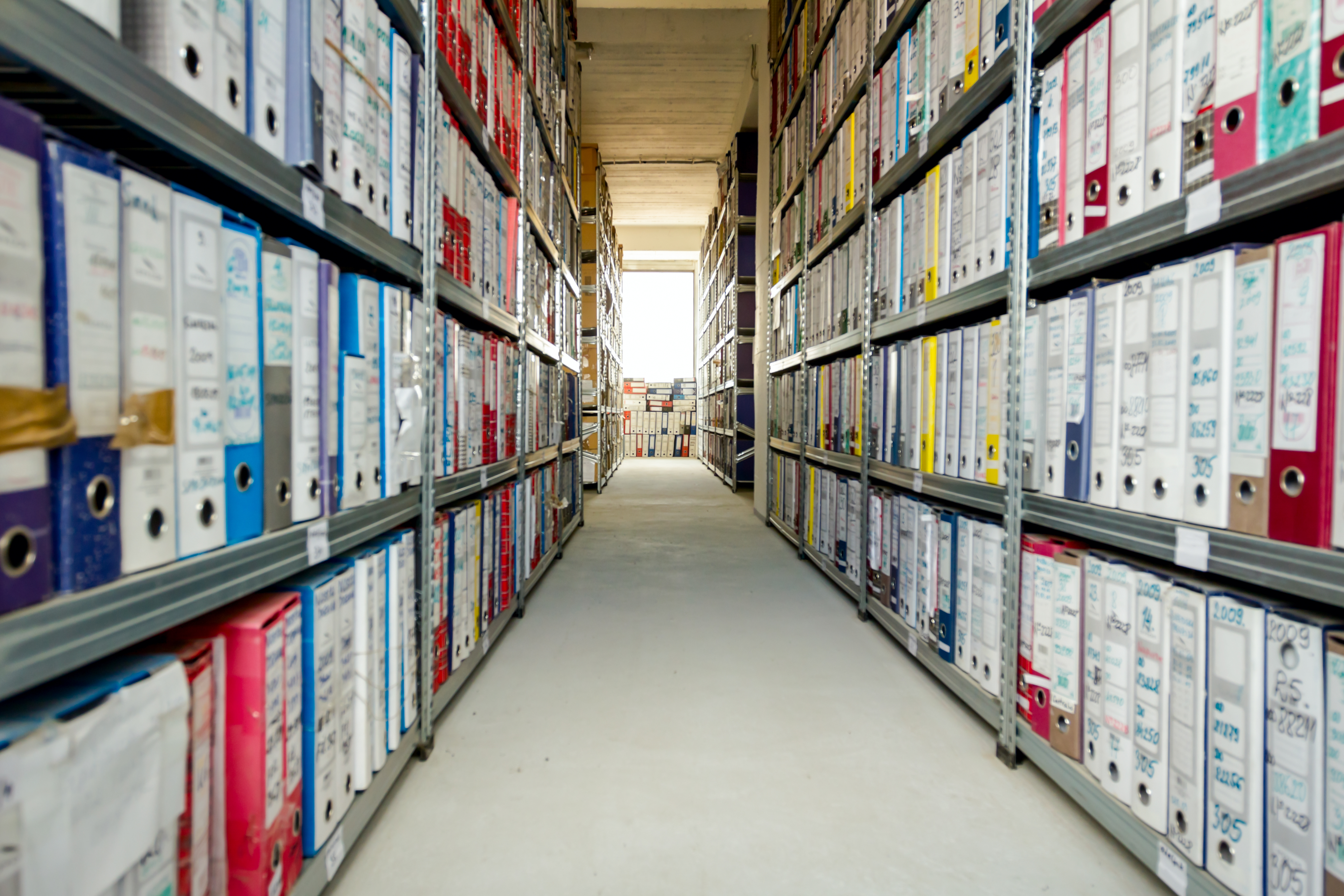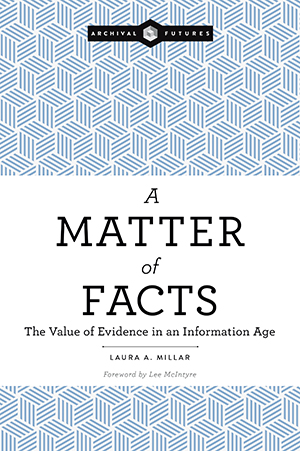An interview with Laura A. Millar: "Truth matters. Facts matter. Evidence matters more."
The first volume in the new Archival Futures series published jointly by the Society of American Archivists (SAA) and ALA Neal-Schuman, Laura A. Millar's new book A Matter of Facts: The Value of Evidence in an Information Age is an urgent manifesto for our "post truth" world. The archives luminary, who was honored with the 2011 Waldo Gifford Leland Award, encourages readers to understand more fully the importance of their own records and archives, for themselves and for future generations. In this wide ranging interview, she talks about her reasons for writing the book, why she chose "evidence" as its core concept, and her outlook for the future.
Over your long career you’ve authored dozens of publications. This new book somehow feels like summation of your convictions. What was the initial seed that got you started writing it?
In late 2016, as I was debating whether to start a new writing project, Chris Prom, Chair of the Society of American Archivists’ Publications Board, contacted me to ask if I would consider writing a book on archives for the general public. After focusing on a professional audience for so long, I was keen to work on something for the public. The initial idea was to write a book on managing personal archives. But as we all know, world politics had changed dramatically by the end of 2016. Populists had taken power in many countries, and the daily news was filled with stories of data manipulation, leaked  records, and information security breaches. Writing a “how to” book on archives in the midst of political chaos did not seem as important as fighting back against data manipulation, alternative facts, and fake news. I decided that a better use of my energies would be to write a book for the wider public on the value of records, archives, and data as evidence.
records, and information security breaches. Writing a “how to” book on archives in the midst of political chaos did not seem as important as fighting back against data manipulation, alternative facts, and fake news. I decided that a better use of my energies would be to write a book for the wider public on the value of records, archives, and data as evidence.
A Matter of Facts encapsulates my belief that archives are not only about the past. Records, archives, and other sources of documentary evidence are not “just old stuff” to be used by historians and genealogists. They are critical tools for preserving democracy, supporting accountability, fostering identity, and preserving and sharing individual and collective memory. I hope that the book conveys my passion about the importance of valuing evidence and then protecting it so that everyone in society, now and centuries into the future, can benefit from access to immutable sources of proof.
You state in your introduction “I have written this book for the public, not for my professional colleagues.” What lead you to take that approach and how was it different?
I have worked as a records and archives consultant for nearly 35 years, and I have written dozens of journal articles, presentations, training manuals, textbooks, and other works. In my career, I have been exposed to many different recordkeeping environments, including international organizations such as the United Nations; national and state governments from Trinidad to Hong Kong to Fiji; and local organizations, charities, religious institutions, and indigenous governments. I have developed electronic records management policies, devised databases for the dissemination of digital photographs, and set up processes for preserving traditional sources of knowledge. I wanted to share my years of experience with the public and help them see why I am so passionate about protecting evidence.
Also, I love to write. Sitting with a computer screen filled with words is like spending the day with good friends. But writing professional and business documents can be limiting. I wanted to tell stories instead of drafting procedures, and I wanted to speak with my own voice instead of using the language of bureaucracy. Writing A Matter of Facts allowed me to find ways to bring archives to life for the general public, to convey my core message as engagingly as possible. I want the reader to realize that there are many different types of documentary evidence in the world, and that this evidence can be used to shape identities, create memories, and underpin accountability. Evidence must be valued, protected, and shared.
“Evidence,” which you differentiate from data, information, or facts, is the book’s key concept. Why?
I have long held a broad and fluid definition of “archives” — much broader than many of my colleagues. I believe that every society defines evidence in its own way, as I have seen in my work around the world. A piece of paper can hold evidence, but so can a piece of wood, or a palm leaf, or a clay tile. I find the term “archives” increasingly limiting. It is bad enough that people think backing up a computer drive is “archiving,” but even worse is when people talk about archives as “old” and “dusty,” valuable “only” for history. How often does a researcher say they “found” something “lost” or “hidden” in the archives, and it turns out they “found” it by reading the archival institution’s finding aid? This misguided concept of archives places evidence at risk. People think archives has to be old to be preserved, but in a digital age, records might never get old enough to “become” archives and thus be deemed worthy of preservation. “Evidence” is a much better term. It allows me to demonstrate the ways in which different cultures interpret evidence while emphasizing that every society has a responsibility to protect evidence in order to support accountability, identity, and memory. As more and more sources of evidence are “born digital,” the distinctions between records and archives and data are blurring. Facebook posts, Twitter messages, emails, and text messages can serve as evidence. The risks to digital evidence are severe — once a record or data element is deleted or leaked or manipulated, that genie cannot go back in the bottle. In A Matter of Facts, I emphasize the term “evidence” because I want to demonstrate the critical value of all types of documentary resources — records, archives, and data  with evidential value — which can serve as proof today, tomorrow, and a century from now.
with evidential value — which can serve as proof today, tomorrow, and a century from now.
You also write, “In the end, if we do not protect evidence, we cannot protect evidence-based truth.” Are you optimistic about the future?
I am by nature an extremely optimistic person. One of my favourite sayings is “My glass is half full … the other half was delicious!” But we are living in perilous times for democracy. I am not so sanguine these days. The average person, myself included, has perhaps placed too much faith in the stability of democracy, the assumption of equality, and respect for the law. I want to believe that government elections are free and fair, that politicians have the public’s interests at heart, and that discrimination and inequity, while not eradicated, are increasingly anomalous. But the reality in 2019 is that laws are ignored, often blatantly; discrimination is rife; and the noble efforts of the #MeToo movement are too often overshadowed by a “Me First” mentality.
Stable and compassionate societies are (and ought to be) founded on an acceptance of reasonable laws and of respect for the rule of law. No one person is, could be, or should be above the law. If we do not adhere to this fundamental tenet of civilization, we face chaos and anarchy. One of the ways to hold people to account, and to enforce the law and the rule of law, is to protect authentic and reliable sources of evidence. In such difficult times, we don’t just need truth. We need proof. Protecting evidence is not the only solution to an abuse of power, but it is one of the ways in which democratic societies hold themselves accountable, compassionate, and respectful. I hope that A Matter of Facts will raise public awareness of the importance of respecting records, archives, and other sources of evidence, and of the need to protect evidence from manipulation or destruction.
But I hope the book accomplishes more. I want people not only to respect evidence but also to embrace it. I want people to visit archival institutions, museums, and libraries. I want them to take photographs and write letters and share stories. I want them to use evidence as a tool for democracy and as a source of identity, memory, and connection. If people come to value the importance of evidence, perhaps they will hold a March for Evidence, similar to the powerful March for Science. On that day, as I march at the head of that parade, I will consider my glass well more than half full!
In the latter half of your book, you lay out the necessity of taking action. How can we, as recordkeepers, archivists, librarians, and concerned citizens, start to make a difference?
There is so much “we” can do — “we” being professionals and “we” being the public. Throughout the book, I offer examples of why documentary evidence is important and of how people can use sources of evidence. I hope that people reading the book will agree with me that “information” and “data” can in fact serve as evidence and that protecting evidence and making it available for public use is fundamental to democratic, respectful, self-aware societies. Recordkeepers, archivists, and librarians can continue to be the consummate professionals we have always been. We need to protect evidence of all sides of the story, not just the perspectives we agree with or the viewpoints we prefer. Life is messy and complicated, and sometimes the evidence we are tasked with preserving is not nice. But it is not the recordkeeper’s job to judge. Our job is to protect and make available authentic  and reliable sources of proof, from myriad perspectives, so that people can review the evidence and come to their own conclusions. Then our job is to protect that evidence so that it remains available, with its authenticity intact, for the next person, and the next, and the next. Records, archives, and library professionals can also continue to offer a warm welcome to the users of the materials in our care. We work on behalf of society, and we can and should do all we can to ensure our physical and digital collections are both safe and accessible. We also need to increase our efforts to serve as advocates and educators. If we want digital evidence to survive, we must educate records creators about what they can do to capture and preserve their records and data now, so that these sources of evidence remain authentic and reliable for as long as needed. Recordkeepers cannot always be involved at every stage of records and archives management; we need to share our knowledge with the public so they can take positive action from the beginning.
and reliable sources of proof, from myriad perspectives, so that people can review the evidence and come to their own conclusions. Then our job is to protect that evidence so that it remains available, with its authenticity intact, for the next person, and the next, and the next. Records, archives, and library professionals can also continue to offer a warm welcome to the users of the materials in our care. We work on behalf of society, and we can and should do all we can to ensure our physical and digital collections are both safe and accessible. We also need to increase our efforts to serve as advocates and educators. If we want digital evidence to survive, we must educate records creators about what they can do to capture and preserve their records and data now, so that these sources of evidence remain authentic and reliable for as long as needed. Recordkeepers cannot always be involved at every stage of records and archives management; we need to share our knowledge with the public so they can take positive action from the beginning.
But A Matter of Facts is written for the public, not for my professional colleagues. Much of the guidance in my book addresses public actions, not professional solutions. Throughout the book I offer many concrete suggestions for action. The first and most important message I want to convey to the general reader is that evidence is not a casual by-product of life and work, and there is no guarantee that evidence will always be safe and accessible. Evidence is a crucial resource that needs to be managed from the moment it is created, and for as long as it is needed, from one day to forever. In an age when digital evidence can be deleted in an instant, I hope the person reading my book will come away with a greater understanding of the importance of managing his or her own evidence actively from the moment of creation. I also hope that readers will be motivated to work more closely with recordkeeping and information professionals. Everyone in society needs to come together to lobby for stronger laws to support the protection of records, archives, data, information, and other sources of evidence. We also need to come together to encourage the development of robust, effective, and ethical information and recordkeeping technologies. A bigger automobile may not be a better automobile. It may just be a greater source of pollution. Similarly, a bigger computer is not the answer to poor evidence management. A much more sustainable approach is to implement more effective processes and technologies for the creation and care of records and archives.
Finally, I hope that readers of the book will be inspired not only to protect their own sources of evidence, such as photographs and text messages and emails and diaries, but also to use documentary evidence — records and archives — actively and enthusiastically. The doors of archival institutions, whether physical and virtual, are open to the public. Archives are not for the elite; they are for all of us. I want the people reading A Matter of Facts to feel inspired and encouraged: to create records, to protect archives, and to use evidence in all its forms. Evidence helps support accountability and democracy, allows us to share memories and tell stories, enhances our sense of individual and collective identity, and helps us make connections with the past and the present. I hope my book helps people see how precious evidence really is.
Learn more at the ALA Store.
